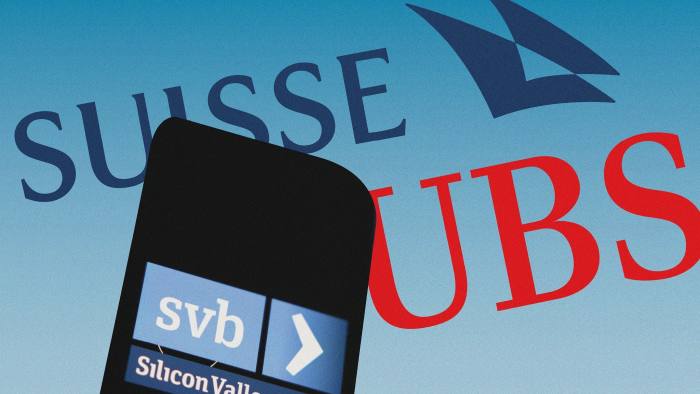[ad_1]
Christine Lagarde has acknowledged that turmoil in the banking sector could force the European Central Bank to stop raising interest rates, should the recent market jitters hit lending to the eurozone’s businesses and households.
The ECB president told MEPs on Monday that eurozone banks had “very limited exposure” to Credit Suisse after it was taken over by its rival UBS in a weekend rescue deal that imposed losses on shareholders and wiped out SFr16bn of risky additional tier 1, or AT-1, debt.
“We are not talking about billions [of exposure to Credit Suisse] here, we are talking about millions,” Lagarde said, adding that the eurozone banking system was “strong in terms of its aggregate capital and liquidity position”.
However, Lagarde warned that the turmoil risked worsening a recent contraction in the supply of credit.
“We are already seeing some tightening of financial conditions,” Lagarde said. “That might be accentuated by the tensions in the banking system and we will have to take that into account as part of the data we review as part of our next monetary policy decision.”
Total eurozone lending by banks in the bloc contracted by €61bn between January and February, the biggest monthly decline since 2013.
The ECB said in January that its quarterly survey of lenders showed they had tightened their lending criteria on business loans by the most since the region’s sovereign debt crisis in 2011. Demand for mortgages fell at the fastest pace on record.
Banks in turmoil

The global banking system has been rocked by the collapse of Silicon Valley Bank and Signature Bank and the last minute rescue of Credit Suisse by UBS. Check out the latest analysis and comment here
The tensions over the past two weeks were “not trivial”, Lagarde said, adding that the collapse of Silicon Valley Bank in the US and crisis at Credit Suisse would “not be without repercussions”. She warned banks would need to prepare for “a potentially less favourable environment” owing to lower growth, rising funding costs and higher defaults.
The ECB last week raised rates by half a percentage point, taking its deposit rate to 3 per cent, to tackle inflation that remains more than four times above its 2 per cent target.
The decision came despite calls for it to pause to see how the turmoil in the banking system plays out. Markets are pricing in a high chance that last week’s rate increase will be followed by a pause by the ECB at its next policy meeting on May 4.
The US Federal Reserve and Bank of England are due to announce their rate decisions later this week.
“There may come a point where central banks have no choice but to let inflationary concerns take a back seat and cut interest rates to shore up confidence,” said Vicky Redwood, a former Bank of England official who advises research group Capital Economics.
However, Lagarde repeated that there was “no trade-off” between fighting inflation and maintaining financial stability. She said the ECB was “ready to respond as necessary” to preserve price and financial stability in the euro area. It was monitoring markets and its toolkit was “fully equipped to provide liquidity support to the euro area financial system if needed”.
She also said eurozone lenders were “well supervised”, with more than 2,200 banks in Europe covered by Basel III rules requiring them to maintain a minimum level of liquid assets. In the US, fewer banks are required to meet globally-agreed Basel standards, with only the biggest lenders needing to follow the rules.
[ad_2]
Source link

